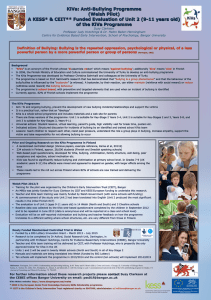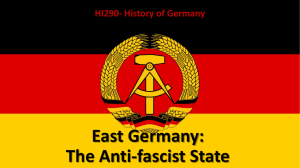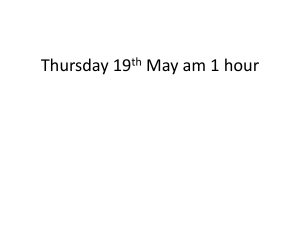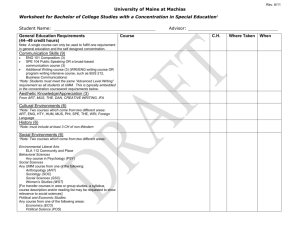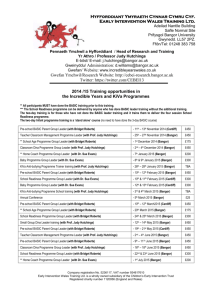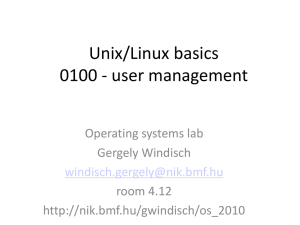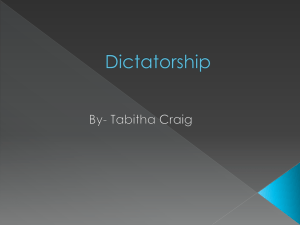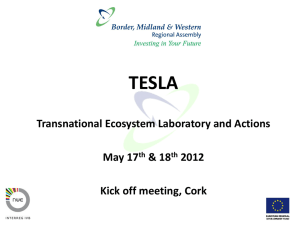Aufarbeitung von Geschichte und Folgen der SED
advertisement
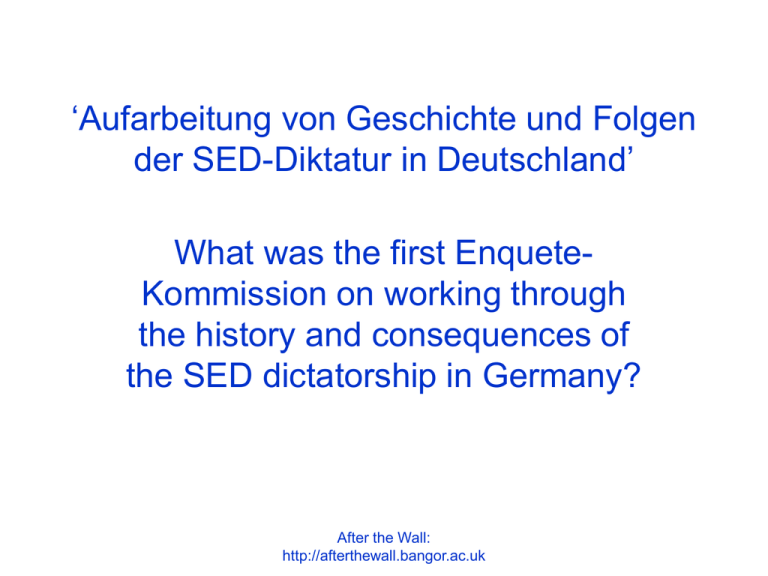
‘Aufarbeitung von Geschichte und Folgen der SED-Diktatur in Deutschland’ What was the first EnqueteKommission on working through the history and consequences of the SED dictatorship in Germany? After the Wall: http://afterthewall.bangor.ac.uk Presentation outline • What is an Enquete-Kommission? • The basics of the first Enquete-Kommission • The aims of the first Enquete-Kommission • Outcomes of the first Enquete-Kommission After the Wall: http://afterthewall.bangor.ac.uk What is an Enquete-Kommission? • Working groups set up by national or regional government. • Aim to come up with solutions for long-term social problems or issues. • The working group should come to a collective agreement about the issue in question. • This should represent the majority of the population, including the interests of marginalised groups. After the Wall: http://afterthewall.bangor.ac.uk The basics of the first Enquete-Kommission • The first Enquete-Kommission began in 1992 and lasted for two years. • Its overarching aim was to work through the history and consequences of the SED dictatorship in Germany. • The Enquete-Kommission consisted of members of the Bundestag, political specialists, eye-witnesses and academics. After the Wall: http://afterthewall.bangor.ac.uk The aims of the first Enquete-Kommission (1) The Enquete-Kommission had five aims: 1. To ensure that the dictatorial powers which oppressed people in the GDR were never given a political chance in unified Germany. 2. To provide the victims of the regime with ‘historical justice’ by redressing the injustice of the SED. 3. To contribute to the inner unity of Germany by increasing awareness about how the SED regime impacted upon the lives of every person in the GDR as well as on west German society and politics. After the Wall: http://afterthewall.bangor.ac.uk The aims of the first Enquete-Kommission (2) 4. To contribute to the affirmation of the ‘fundamental democratic consensus’ in unified Germany by working through the history and consequences of the SED dictatorship. 5. To guide the legislative body with regard to continuing to eliminate the consequences of the SED regime in Germany. After the Wall: http://afterthewall.bangor.ac.uk Outcomes of the first Enquete-Kommission (1) 1. Learning through remembering: Germans must learn from each other’s life experiences. In order to work through the consequences of the SED regime, it is necessary to understand how different people lived within it. 2. The term ‘dictatorship’: The SED regime should be known as a dictatorship as it provided no democratic voting system for the GDR population. After the Wall: http://afterthewall.bangor.ac.uk Outcomes of the first Enquete-Kommission (2) 3. Continuing to work through the GDR past: Germany must continue to work intensively through the history of the SED dictatorship as part of a democratic political culture. 4. Duties of research: It is crucial that Germany takes on the task of researching the SED dictatorship on a national level. This should include access to the files of political parties, mass organisations, the judiciary and the Stasi. The research should also feed into appropriate learning materials for schools. After the Wall: http://afterthewall.bangor.ac.uk Outcomes of the first Enquete-Kommission (3) 5. Towards political and moral responsibility: The perpetrators of the SED regime must be made responsible for their actions. This will pave the way towards reconciliation between the perpetrators and the victims of the regime. 6. The comparability of totalitarian systems: Identifying the similarities and differences between the SED and National Socialist dictatorships contributes to political self-awareness and democratic culture. After the Wall: http://afterthewall.bangor.ac.uk Outcomes of the first Enquete-Kommission (4) 7. Working through the past and shaping the future: As well as working through the consequences of the SED dictatorship, Germany should remember the presence of solidarity and resistance in the GDR, which led to the democratic revolution of 1989. This is an important part of unified Germany’s identity. After the Wall: http://afterthewall.bangor.ac.uk Useful sources • A full version of the report can be found at: http://dipbt.bundestag.de/dip21/btd/12/078/1207820.pdf. This presentation has focused primarily on the information outlined on pp. 5-6 and 279-283 of the report. After the Wall: http://afterthewall.bangor.ac.uk
